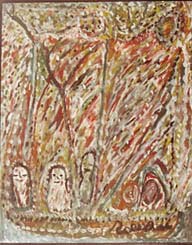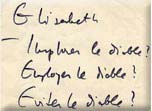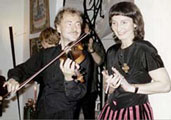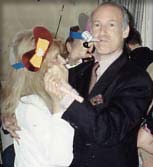|
Aubelin Jolicoeur
 Under the name of Petit Pierre, Aubelin is the hero (if one can call him that) of a book by Jean Raspail, and really he is a character of fiction, crossbred with a Brummel-like dandy, a Dali-like comedian, a Jack Anderson-like journalist, with true zones of shadow but also a treasure of friendly faithfulness. I knew him in Haiti, at the hotel Oloffson – his second home – when I was working on my encyclopaedia Arawak on the West Indies and Guyana. Each day of the first week, he sent me in homage, at the hotel, a painting from his collection of Claire’s Gallery. And on the last day, a wonderful painting by Saint-Brice, the Forest of the Spirits, which writer and minister André Malraux had chosen just before he died, but had not had the time to buy. Aubelin fairly quickly gave up trying to seduce me, because there was a crush women around him. But we stayed good friends, and one evening, he introduced me to Christopher Dodd, at that time congressman, then senator of Connecticut. He introduced me also to the the Princess and Chantoutou (photographer Chantal Regnault), and a painter in the Naïve style drew us in the aspect of the three Goddesses (!) Juno, Aphrodite and Athena, in front of a delightful shepherd Paris (probably Aubelin himself…). Under the name of Petit Pierre, Aubelin is the hero (if one can call him that) of a book by Jean Raspail, and really he is a character of fiction, crossbred with a Brummel-like dandy, a Dali-like comedian, a Jack Anderson-like journalist, with true zones of shadow but also a treasure of friendly faithfulness. I knew him in Haiti, at the hotel Oloffson – his second home – when I was working on my encyclopaedia Arawak on the West Indies and Guyana. Each day of the first week, he sent me in homage, at the hotel, a painting from his collection of Claire’s Gallery. And on the last day, a wonderful painting by Saint-Brice, the Forest of the Spirits, which writer and minister André Malraux had chosen just before he died, but had not had the time to buy. Aubelin fairly quickly gave up trying to seduce me, because there was a crush women around him. But we stayed good friends, and one evening, he introduced me to Christopher Dodd, at that time congressman, then senator of Connecticut. He introduced me also to the the Princess and Chantoutou (photographer Chantal Regnault), and a painter in the Naïve style drew us in the aspect of the three Goddesses (!) Juno, Aphrodite and Athena, in front of a delightful shepherd Paris (probably Aubelin himself…).
The name of Jolicoeur came from the time of slavery, when black people had to choose a name inspired by events or circumstances. His ancestor went ‘wenching’ all the time, therefore he received the name of “nice flirt”, in French, “joli coeur”. As for his first name, he was born in Jacmel, and the dawn was ‘clear as linen’ : Aubelin, in French, means “Dawnlinen”. Others in Haiti are called Chimène not at all because they were loved by a Rodrigue (as in a well known play), but because they were born on the road, in French “chemin”. Creole is very poetic. Aubelin had been for a long time in charge of tourism and was passionate about his island. He knew the terrible Papa Doc, as a child in Jacmel, because Doc Duvalier was the town physician, before becoming the notorious dictator everybody knows. He survived and coasted on an island which had never known anything but palace coups, putsches, fire – and many other disasters, as I wrote in my Encyclopaedia. He wrote numerous madrigals for me, like this one, the 2nd of Mai 1978 :
With your eyes voracious like your heart
How many men did you put in chains
But how many would put you in pain
If they brought chains to you, to make you happy?
 « The Forest of the Spirits », by Saint-Bris, chosen by writer and minister Malraux just before his death, and which Aubelin offered to me. « The Forest of the Spirits », by Saint-Bris, chosen by writer and minister Malraux just before his death, and which Aubelin offered to me.
Jean-Paul Kauffmann
The only one in my list that I don’t know and, maybe, will never know. But he is part of my life, just as much as, or maybe even more, than the creatures of flesh and blood around me. A little bit like in a special effects movie, he switched me into a dreamlike universe, in the maze of his phrases and the concentric circles of his own fluctuation between seclusion and opening to infinity. Indeed, it was love at first (sight-)reading. For his book La Chambre noire de Longwood (« The darkroom at Longwood »). A strange history of an interior odyssey, of liberation in seclusion. I found the same feeling of a journey to the frontier of purity, the unknown, a swoop into the infinity of final and invisible limits, in the first book he wrote on his trip to the Kerguelen islands, L’Arche des Kerguelen. Voyage aux îles de la Désolation. With the same quest for the holy Grail within himself…
Hugues de Kerett
Cultural Attaché at the French Embassy, New York, then director of the House of Writers in Paris, Hugues was at once a colourful and secretive person, Breton and Parisian. Having a passion for Africa, where he lived for a long time, he was writing a book on the life of a river when he died suddenly, young, so young! With a (gentle) sense of humour and never complaining, always so friendly when he came to see me, more and more rarely at the end…
Leszek Kolakowski
 Sceptical Marxist (if this species exists), this Oxford philosopher was expelled from the Party in 1968, and came to Paris. Born in Radom in 1927, gaining a Ph D. in Philosophy from Warsaw University in the same year that Stalin died (1953),he recently published, after almost twenty books, Freedom, Fame, Lying, and Betrayal: Essays on Everyday Life, 1999. I called him when, with Jacques le Goff, , we decided to produce a series on The Epic of Western Culture and to ask Kolakowski to write and direct the book on Religions in the West. I have always been drawn to by this Yiddish theatre mask, with its huge smile splitting the face, the eyes spaced out around the big nose, lips in the brackets of the wrinkles, a humour overlaying a dark power of seduction. During the Congress of what we called the « Ball of Suckers” (of Communism) he sent me this little note. Sceptical Marxist (if this species exists), this Oxford philosopher was expelled from the Party in 1968, and came to Paris. Born in Radom in 1927, gaining a Ph D. in Philosophy from Warsaw University in the same year that Stalin died (1953),he recently published, after almost twenty books, Freedom, Fame, Lying, and Betrayal: Essays on Everyday Life, 1999. I called him when, with Jacques le Goff, , we decided to produce a series on The Epic of Western Culture and to ask Kolakowski to write and direct the book on Religions in the West. I have always been drawn to by this Yiddish theatre mask, with its huge smile splitting the face, the eyes spaced out around the big nose, lips in the brackets of the wrinkles, a humour overlaying a dark power of seduction. During the Congress of what we called the « Ball of Suckers” (of Communism) he sent me this little note.
Théodore Komaniecki
 What would our parties be without Theodore, Polish violinist and pianist with great charm and talent ? Theodore, winner of the First Prize of the Academy of Music, sings, composes, writes splendid songs, stirring and passionate. He is a sensitive soul, a darling who knew me when I was young and danced czardas… and that’s something! What would our parties be without Theodore, Polish violinist and pianist with great charm and talent ? Theodore, winner of the First Prize of the Academy of Music, sings, composes, writes splendid songs, stirring and passionate. He is a sensitive soul, a darling who knew me when I was young and danced czardas… and that’s something!
Nikita Krivochéine
At the very beginning of my investigation on the mental hospitals in the Soviet Union, against dissidents, which gave birth to a book, I met Nikita, then translator for UN, during a memorable dinner in a nice Georgian restaurant near the Eiffel Tower, “La Toison d’Or”. He recently told his story in a book and a movie by Nicolas Jallot, Piégés par Staline (« Trapped by Stalin ») : born in Paris in 1934, he embarked in the Spring of 1948 from Marseille ; destination Odessa. He left with his mother to rejoin his father Igor, hero of the Wrangel Army and of the Resistance against Communism, and later again, while exiled in France, hero of the Resistance against Germans (deported to Buchenwald and Dachau), and who had been expelled a few months earlier by the French Socialist Minister of Interior, Jules Moch. Nikita’s mother, Nina, published a book of memoires, Les Quatre-Tiers d’une vie (« The four thirds of a life »), where she tells about this dark period of time. As soon as he arrived in Moscow, Igor was sent to a forced labour camp, from which he was not released before the death of Stalin in 1954. As for Nikita, he also was sent to a camp (for ten long years!); he was found guilty of high treason and spying when he sent a chronicle of the Soviet invasion of Hungary (in April 1957) to the daily paper Le Monde, as a response to Communist but also anti-Nazi writer Vercors who had written an article to the glory of the regime in USSR.
Then his sentence was “reduced” to three years reclusion in Mordovia. At last, in 1971, he was able to come back to France. Four years later, he became my guide through the shadows, my seafarer through the reefs, and, thanks to him, I could meet Russian refugees in Paris, and then throughout the world, in New York, London (where I met Vladimir Boukovski) or Jerusalem, and do an interview in Moscow with Andrei Sakharov.
Dr. Jean-Pierre Kutner et Françoise
 A pioneer of the fights against male sterility, delivery under epidural ( from which I personally have benefited with the birth of my daughter) and expert in medically assisted procreation, J-P Kutner wrote a book for my Antebi Publishing Cy, called Votre Bébé avant la naissance (“Baby Before Birth”). With his wife Françoise, they are two of those « secularized saints » who, behind the scenes, are working for a better world. A pioneer of the fights against male sterility, delivery under epidural ( from which I personally have benefited with the birth of my daughter) and expert in medically assisted procreation, J-P Kutner wrote a book for my Antebi Publishing Cy, called Votre Bébé avant la naissance (“Baby Before Birth”). With his wife Françoise, they are two of those « secularized saints » who, behind the scenes, are working for a better world.
|



